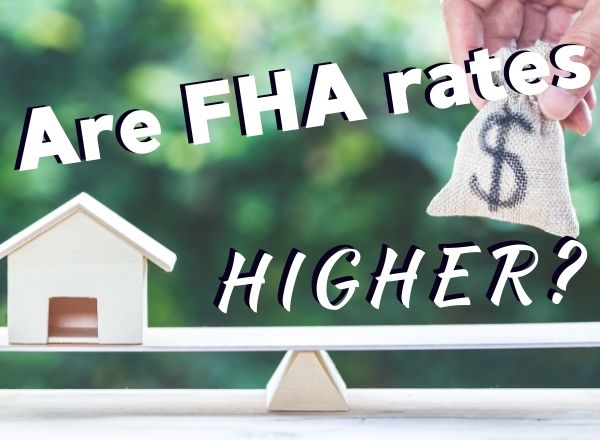Do FHA Loans Have Higher Interest Rates?

Nearly 30% of all home buyers are using FHA loans to finance their new home purchases. These loans are extremely attractive due to the low-down payment requirement and the flexible credit score minimums. What many people ask is whether the interest rates are competitive.
Do FHA loans have higher interest rates?
After 2010, FHA interest rates have been up to .25% lower than conventional rates when comparing borrowers with similar credit scores. However, in some instances the APR for a comparable FHA loan could be slightly higher due to the associated FHA costs and fees.
National mortgage rate statistics for the prior year may show that on average, the interest rates offered for FHA loans may slightly higher than conventional loans because FHA loan applicants often have lower credit scores than conventional loan applicants.
Click to get a custom rate quote for your specific loan scenario
History of FHA Interest Rates 
Prior to 1983, the Federal Housing Administration would set their own rates for FHA loans and lenders had to follow those rate guidelines. There was no arbitrary re-pricing of the loans at that time.
After 1983, FHA interest rates were determined by market conditions and followed the rate changes that conventional loans were experiencing. Lenders also were able to adjust rates based upon various risk factors.
After 2000, FHA rates began to trend about .25% higher than non-government or conventional mortgages due to the increased amount of work required by the lender to originate FHA loans.
When are FHA Rates Higher than Conventional Mortgages?
FHA rates will be higher than conventional rates when the borrower has low credit scores. Although FHA loans are helping to make home ownership more affordable, low credit scores signal high risk to FHA lenders. As a result, they impose interest rate adjustments based upon the credit score of the borrower. The lower the score, the higher the rate will be.
Click to get a comparison of rates – FHA vs Conventional
When are FHA Rates Lower than Conventional Mortgages?
Interest rates for FHA loans will be lower than a conventional loan when the borrower has a high credit score and a small down payment. With conventional loans, putting down just 5% will not only result in PMI, but there will be a rate add-on for the high loan to value ratio. This could result in a rate quote for a conventional loan greater than that of an FHA loan.
How do Lenders Determine FHA Interest Rates?
These are the primary factors which may influence the rate offered by an FHA lender.
- Credit Score
- Loan Amount
- Loan Type (Purchase, Streamline Refinance, 203k Rehab, Construction)
Your credit score is the most influential factor in determining the interest rate offered by a lender. It is often overlooked until the day home buyers begin rate shopping. We have seen interest rates vary as much as 2% when comparing rates for individuals with a 600 credit score vs a 700 credit score. We suggest you get a free credit report online to understand what your credit scores are.
Small loan amounts below $100k will also negatively impact the interest rate. The paperwork and time it takes to process the loan is the same regardless of loan size. So, to make the loan profitable they may bump the rate up a bit or charge more in fees.
The loan type matters because 203k rehab and FHA construction loans will require so much more work on the part of the lender. In fact, they are so involved that many lenders simply refuse to offer those FHA loans.
Related Articles
How to Get Pre-Approved for an FHA Loan – Learn the steps you need to take to get pre-approved.
FHA Loan vs Conventional Loan – This article discusses the differences between an FHA and conventional loan, the pros and cons and what is needed to qualify for both.
What is an FHA Loan? – This is Dave Ramsey’s view of FHA loans
